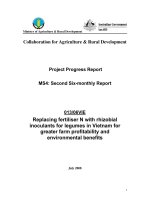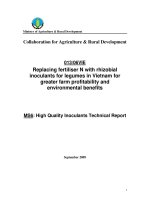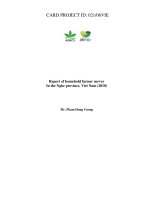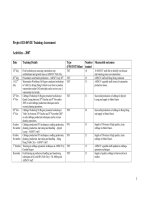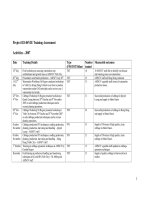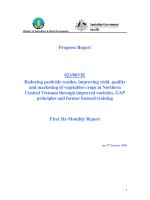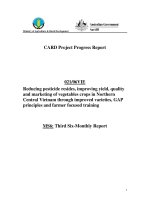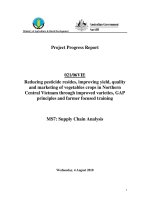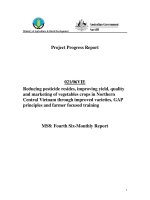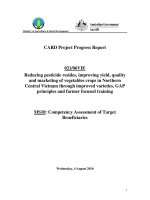Báo cáo khoa học nông nghiệp " Field evaluation and advanced vegetative mass-propagation technology for scaling up high-value plantations of Pinus caribaea and related hybrids in Vietnam - MS3" ppt
Bạn đang xem bản rút gọn của tài liệu. Xem và tải ngay bản đầy đủ của tài liệu tại đây (77.24 KB, 6 trang )
Ministry of Agriculture & Rural Development
___________________________________________________________________________
CARD Project Progress Report
033/05 VIE
Field evaluation and advanced vegetative mass-
propagation technology for scaling up high-value
plantations of Pinus caribaea and related hybrids
in Vietnam
MS3: Second Six Monthly Report
September 2006 – February, 2007
Institute Information
Project Name
Field evaluation and advanced vegetative mass-propagation
technology for scaling up high-value plantations of Pinus caribaea
and related hybrids in Vietnam
Vietnamese
Institution
RCFTI, Forest Science Institute of Vietnam (FSIV), MARD
Vietnamese Project
Team Leader
Dr Ha Huy Thinh
Australian
Organisation
Forestry Plantations Queensland (Formally trading as DPI Forestry)
Australian
Personnel
Mr Ian Last
Date commenced
February 2006
Completion date
(original)
February 2008
Completion date
(revised)
February 2008
Reporting period
6 months to February 2007.
Contact Officer(s)
In Australia: Team Leader
Name:
Ian Last
Telephone:
+61 (0) 7 5482 0891
Position:
Manager, Forest Policy
Fax:
+61 (0) 7 5482 3430
Organisation
Forestry Plantations Queensland
Email:
In Australia: Administrative contact
Name:
Ian Last
Telephone:
+61 (0) 7 5482 0891
Position:
Manager, Forest Policy
Fax:
+61 (0) 7 5482 3430
Organisation
Forestry Plantations Queensland
Email:
In Vietnam
Name:
Dr Ha Huy Thinh
Telephone:
Office: (84) 4 8389369
Mob: (84) 9120 60717
Position:
Director
Fax:
(84) 4 836 2280
Organisation
Research Centre for Forest Tree
Improvement, (RCFTI)
Email:
2
1. Project Abstract
The Project seeks to review existing experience with and performance of several tropical
conifer species in Vietnam, particularly Caribbean Pine, and to establish further trials of
improved genetic material, including hybrids.
The project will also provide capacity building for Vietnamese Forest Research
institutions relating to Pinus tree improvement and mass propagation systems via training
in Queensland and Vietnam, development of small scale hedge and nursery infrastructure,
and a study tour to Australia, involving innovative Vietnamese forest managers /
researchers.
Finally, the project will build awareness amongst large and small-scale forest growers
including ethnic minorities, through the establishment of collaborative demonstration
plantings in priority regions for Pinus plantation expansion, supported by appropriate
training.
Key achievements during the 2
nd
six-monthly reporting period include:
1. Genetic evaluation trials established to compare performance of locally available
and introduced tropical pines in Vietnam (Milestone 4);
2. Further pine seed sent to Vietnam and plants being raised for larger scale
demonstration trials (part of Milestone 9);
3. Pilot scale hedge facilities established at 3 sites for the production of Pinus
cuttings (part of Milestone 7); and
4. Comparative performance of tropical pines in Vietnam completed including
technical report (Milestone 8)
2. Executive Summary
Progress during the 2
nd
six- month reporting period has been in accordance with the project
Logframe. Highlights include:
• establishment of genetic evaluation trials at six sites;
• completion of pilot scale hedge facilities at three sites;
• completion of technical report titled “Review of the Performance and suitability of Pinus
caribaea in Vietnam”
The Australian project leader and a nursery specialist plan to visit Vietnam in May 2007 to conduct
nursery training, to inspect genetic evaluation trials, to discuss plans for larger scale demonstration
trials and to generally review progress against all objectives and discuss any emerging issues with
Vietnamese partners.
3. Introduction & Background
Project objectives, outputs, approach and methodology can be summarised as follows:
3
Objective 1: Identify the most highly productive, well-adapted varieties and hybrids of Pinus
caribaea, in comparison to other pine species currently planted, for priority pine planting zones.
Output 1.1: Review and report on comparative performance of pines in Vietnam based on
existing trials and related information.
Output 1.2: Establish genetic evaluation trials to compare performance of locally available and
introduced pines on multiple sites throughout key regions in Vietnam.
Output 1.3: Review pine genetic resources and related breeding strategies and capabilities /
resources in Vietnam, particularly for Pinus caribaea and related hybrids.
Objective 2: Provide practical training and support to forest research institutes in Vietnam to enable
the development and local adaptation of hedge and containerised nursery systems for the mass
propagation of containerised pine cuttings.
Output 2.1: Trained personnel able to establish and manage hedge beds, collect and set shoots
and raise containerised cuttings.
Output 2.2: Locally adapted Nursery Manual and related checklists developed.
Output 2.3: Three pilot scale hedge and containerised nursery facilities established and various
prescriptions tested.
Objective 3: Create improved awareness amongst rural poor smallholders and industrial forest
growers in key pine growing regions, regarding the potential performance of improved varieties of
Caribbean pine to supply a range of forest products and services via the establishment of
demonstration plantings in collaboration with local land owners.
Output 3.1: Establish two demonstration trials with large scale forest growers.
Output 3.2: Establish community and individual farmer managed plantings in collaboration with
local ethnic minority communities.
4. Progress to Date
4.1 Implementation Highlights
General
Inception Meeting at Hanoi (15/2/06) attended by over 20 participants
Study tour to Australia by Vietnamese researchers (Jun’06)
Objective 1
Output 1.1: Completed. Technical report titled “Review of the Performance and suitability
of Pinus caribaea in Vietnam” (in English and Vietnamese) submitted to CARD PMU
(Milestone 8)
Output 1.2: Completed. Genetic evaluation trials established at 6 sites. Report to be
submitted under Milestone 4.
Output 1.3: Discussions on breeding strategy held during July’06 visit (Dr Dieters).
Objective 2
Output 2.1: Nursery training in Queensland completed (May’06). Training in Vietnam
scheduled for May’07
Output 2.2: Nursery Manual prepared and circulated. To be reviewed in May’07
Output 2.3: Three pilot scale hedge and nurseries established and first batch of pine cuttings
set.
4
Objective 3
Outputs 3.1 & 3.2: Discussions held with local minority people at Dak P’Lao, site of
proposed demonstration planting (Feb’06 and Nov’06)
Discussions and inspection (Ngoc Lac) with Thanh Hoa Raw Material Company
Seed for demonstration trials forwarded to Vietnam and plants currently being raised. Trial
sites and partners to be finalised during May’07 visit.
Detailed implementation progress is recorded in attached Progress Report Logframe
4.2 Capacity Building
Australian Study Tour (June’06) was reported in the 1
st
six-monthly Progress Report.
Additional funding was secured under the ATSE Crawford Fund, an initiative of the Australian
Academy of Technological Sciences and Engineering. This enabled Miss Nghiem Quynh Chi (one
of the key project staff) to visit Queensland for 3 months (late August– late November ‘06) to
support project outcomes. Miss Chi participated in a wide range of capacity building activities
covering: pine pollination, pine grafting, seed centre management, pine tissue culture, nursery and
hedge management, genetic trials inspections, quantitative and molecular genetics theory and, of
course, speaking English!
4.3 Training Programs
Nursery training (4 participants) in Queensland (May’06) is detailed in the 1
st
six-month Progress-
report. A draft Nursery Manual (Vietnamese and English) has been provided to participants) and will
be revised following scheduled training in Vietnam (May’07), once partners have had more local
experience with the techniques.
4.4 Publicity
The project was featured in the latest CARD Newsletter (No. 2, December’06).
4.5 Project Management
There have been no major issues relating to Project Management.
5. Report on Cross-Cutting Issues
5.1 Environment
There have been no major (negative) environmental issues associated with the Project.
5.2 Gender and Social Issues
The Nursery Training in Queensland was conducted by women and involved 50% representation by
women trainees. The 3-month ATSE Crawford Fund Traineeship provided additional capacity
building opportunities for one of the key (female) project staff.
Discussions with small holders and ethnic minority groups regarding demonstration plantings are at a
formative stage. Smallholder involvement is planned as a year 2 output.
5
6. Implementation Issues
6.1 Issues and Constraints
To date, there have been no major issues or constraints. Minor issues relate to:
Incomplete germination of seed forwarded to partners resulted in minor modifications to
previously agreed design of genetic evaluation trials.
Lack of site uniformity and patchy survival at some genetic evaluation sites may complicate
long-term data analysis.
Patchy survival at for some hedge plants (FRC, Phu Ninh) may reduce number of cuttings
produced at this nursery.
6.2 Options
Refilling of plants in genetic evaluation trials and nursery hedge plants has occurred to minimise
long-term impacts.
7. Conclusion
The project is progressing well with most activities either complete or well advanced. The May’07
visit will enable the Nursery Manual to be finalised and progress with setting cuttings and hedge
management to be reviewed. It will also enable plans for the demonstration trials to be finalised and
some genetic evaluation trials will be inspected.
6
